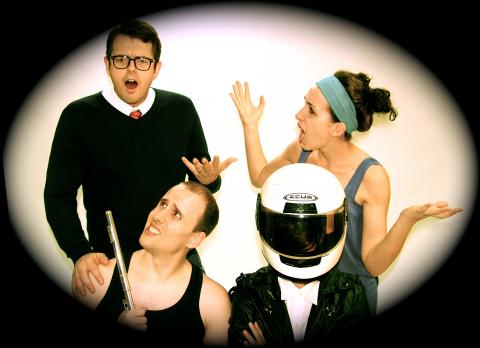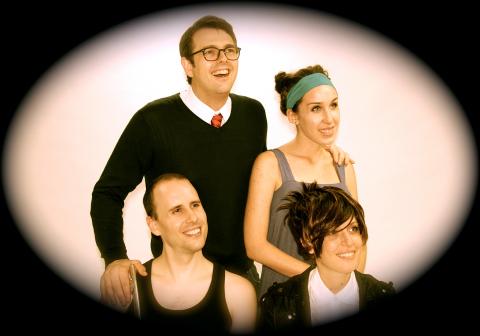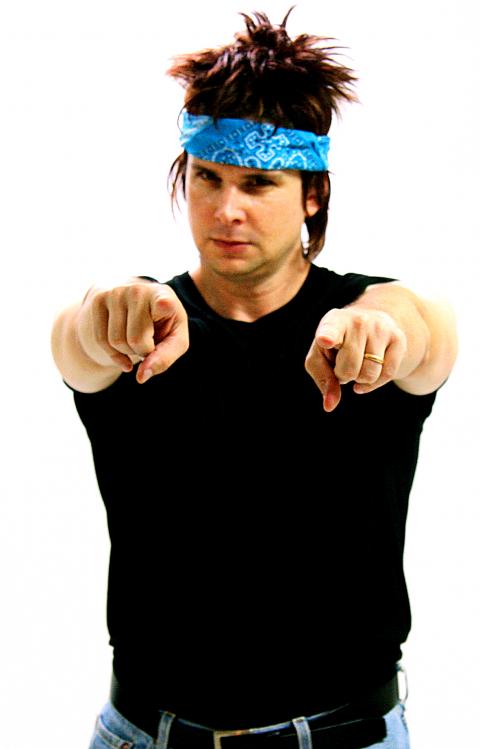Theater group Taipei Players is back in action this weekend with three original short plays that were selected as winners in a writing contest held earlier this year.
Co-producer Sarah Zittrer said that Taipei Players started with straight-up comedy because “you need a break from work, [and] want to have a good time.” This show, however, also aims to challenge people, “though [the plays] are still funny … in different ways.”
Producer and director Mandy Roveda said: “The [winning works] represent three different styles of comedy. One is a farce, one is satirical, and one is a serio-comedy.”

Photo courtesy of Gary Hillis at Digital Canvas Films
Zittrer and Roveda focused on choosing pieces that balanced and complemented each other, with a range of topics “because different things speak to different people.”
Holly Harrington’s Outed, Mauro Sacchi’s Package Piece, and Matthew Lippart’s Creative Control will debut over four shows tomorrow and Sunday.
The three playwrights, interviewed during the Players VIP party at Awfully Chocolate in Taipei earlier this week, could not be more different.

Photo courtesy of Gary Hillis at Digital Canvas Films
Lippart was “between writing projects” when he saw the competition on Facebook. “I’ve never actually seen a play before,” he said. “I’ve seen musicals, I don’t know if that is a play.” He had also never seen a script, so he studied a scriptwriting Web site. “It took me a week to write the play, three days to learn just the format.”
A New Mexico native, Lippart claims he ended up in Myanmar after accepting a job teaching math there, but had no idea of its geographical location, because they “call it Burma in the States.”
Creative Control is based on his experience trying to record a heavy metal album there. “There were lots of hoops, censorship, army guys everywhere,” he said. “They love having guns, but I didn’t put the guns in the play.” Instead he focuses on the absurdity of trying to deal with censorship.

Photo courtesy of Gary Hillis at Digital Canvas Films
Mauro Sacchi, an actor and dancer for Taiwan’s Horse Dance Theatre (驫舞劇場) company, wrote the serio-comedy Package Piece six years ago while teaching an Italian workshop in the US. Currently in artist’s residence in Hualien to rehearse for an upcoming show, he reworked the piece using “much more concise English.” “I’m really into words and the body,” said Sacchi, who studied English and pre-med at university. “So it all works out now — I’m a dancer so I don’t get to use words, but the play being put out makes it come full circle.”
The story “is about a guy handling his package,” Sacchi said. “No pun intended! The character tells a story, guessing what is in the package with his name on it.”
Holly Harrington has worked previously with Taipei Players as an actress, and began writing the screenplay for Outed last year. “Many of my friends in Taipei are gay and I’ve heard all their stories and experiences,” she said. Her play has a twist on the usual concept of “outing,” and she is very happy to have fellow thespian Brandon Thompson playing one of the leads, as she had mentally cast him in the role of the father while writing it. “Every time I write I have in mind the actor for the character,” she said. “Even if that doesn’t end up being who plays it, still the characters’ personalities are based on real people.”
Special guest, DJ, live vocalist, spoken word artist, and poet LEO37 will round out the evening’s entertainment.
For the first time, Taipei Players will project Chinese subtitles on the side wall. “We perform in English,” said Roveda, “but we wanted to make it inclusive for everyone.”

This month the government ordered a one-year block of Xiaohongshu (小紅書) or Rednote, a Chinese social media platform with more than 3 million users in Taiwan. The government pointed to widespread fraud activity on the platform, along with cybersecurity failures. Officials said that they had reached out to the company and asked it to change. However, they received no response. The pro-China parties, the Chinese Nationalist Party (KMT) and Taiwan People’s Party (TPP), immediately swung into action, denouncing the ban as an attack on free speech. This “free speech” claim was then echoed by the People’s Republic of China (PRC),

Exceptions to the rule are sometimes revealing. For a brief few years, there was an emerging ideological split between the Democratic Progressive Party (DPP) and Chinese Nationalist Party (KMT) that appeared to be pushing the DPP in a direction that would be considered more liberal, and the KMT more conservative. In the previous column, “The KMT-DPP’s bureaucrat-led developmental state” (Dec. 11, page 12), we examined how Taiwan’s democratic system developed, and how both the two main parties largely accepted a similar consensus on how Taiwan should be run domestically and did not split along the left-right lines more familiar in

As I finally slid into the warm embrace of the hot, clifftop pool, it was a serene moment of reflection. The sound of the river reflected off the cave walls, the white of our camping lights reflected off the dark, shimmering surface of the water, and I reflected on how fortunate I was to be here. After all, the beautiful walk through narrow canyons that had brought us here had been inaccessible for five years — and will be again soon. The day had started at the Huisun Forest Area (惠蓀林場), at the end of Nantou County Route 80, north and east

Specialty sandwiches loaded with the contents of an entire charcuterie board, overflowing with sauces, creams and all manner of creative add-ons, is perhaps one of the biggest global food trends of this year. From London to New York, lines form down the block for mortadella, burrata, pistachio and more stuffed between slices of fresh sourdough, rye or focaccia. To try the trend in Taipei, Munchies Mafia is for sure the spot — could this be the best sandwich in town? Carlos from Spain and Sergio from Mexico opened this spot just seven months ago. The two met working in the